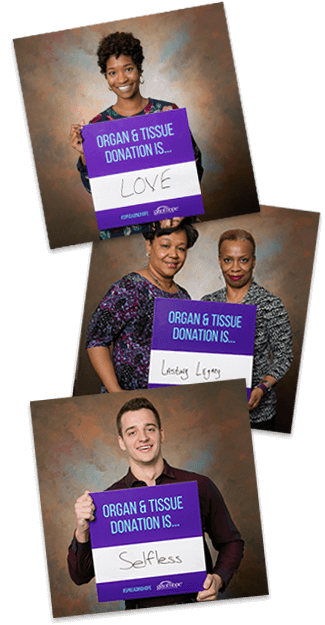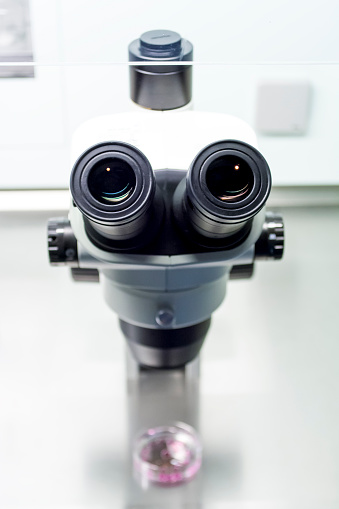In response to the shortage of organs available for transplantation, living donation has emerged as a potential option for relatives, loved ones, friends and others to save and enhance people’s lives.
Who Can Be a Living Donor
You may have heard of people who can be an organ donor while still alive and well. This is called being a living donor, and it has the incredible power to change lives through organ donation and tissue donation. If you are interested in supporting organ and tissue transplantation and would like to know more about being a living donor, there are a few important requirements you must meet.
- Living donors must be 18 years of age or older and must be compatible with the transplant candidate.
- You should be prepared to share any and all health information (physical and mental) with your doctor.
- A living organ donor or tissue donor must be in excellent health, both physically and mentally. You should not have uncontrolled high blood pressure, cancer, diabetes, HIV/AIDS, hepatitis, or any organ diseases.
- If you are choosing to donate a kidney, both you and the recipient must undergo extensive medical and psychological screenings for your protection.
- You should be fully educated about any potential risks or complications.
- Your choice to be a donor should be voluntary, and you cannot legally be paid for the donated organ.
See more at Living Donation California

Who and How Can You Help?
As a living organ donor, you have the potential for making an incredible impact on someone’s life in three different but equally powerful ways:
Directed Donation
Directed organ donation involves donating your kidney to a predetermined transplant candidate. Many people interested in learning how to become an organ donor choose the path of directed organ donation because of a known transplant candidate need. The donor and candidate of choice may be biologically connected, or blood relatives, such as parents, siblings, or adult children. The donor may choose to work with an unrelated transplant candidate for their organ or tissue donation, such as a spouse, significant other, friend, or colleague. In some cases, a directed organ may be a stranger to the candidate, having learned merely about their need in some way.
Donor Chains
Donor chains involve linking a collection of opposite pairs of kidney donors and recipients with those that are compatible. This “domino effect” process can allow a single donor to set off a long chain of donation that saves many lives.
See more at Living Donation California
Non-Directed Donation
Non-direction organ involve donors being matched with an anonymous candidate from the national waiting list. If you are wondering how to become a donor, but don’t know anyone with a specific need, this may be the path for you.
How Do You Start the Process?

Transplant centers with living donor transplant programs coordinate living donations directly. To learn more about becoming a living donor, contact a transplant center that offers a program in your area.
The organ donation process first begins with a thorough discussion about your medical history, with transplant center staff asking you a variety of questions about past or present medical conditions. The purpose of this step in the process of organ donation is to determine if you have any health conditions that prevent you from being an organ donor or tissue donor. You will also complete a blood test to determine if you are compatible with the selected transplant candidate. You will even have the opportunity to ask any questions you may have, as well as learn about both risks and benefits of being a living donor.
It is important that you address any questions or concerns you may have about the process. The transplant center staff is there to ensure you are comfortable and confident in your decision to become a living donor.
See more at Living Donation California
Step-by-Step Evaluation
Once you have met with the transplant center staff, and learned more about how to become an organ donor, you will need to decide if you would like to proceed with the organ donation process. If you choose to move forward in becoming a living organ donor, the next step in the donation process will be to work with transplant center staff to undergo their evaluation process.
The evaluation process is a critical part of the process of organ donation, for both the living donor and the eventual organ recipient. Often, when individuals are learning about how to become a living donor, they may not consider whether the donation process is a good fit for them physically and emotionally. The transplant center staff utilizes information gathered in their evaluation process to help both the donor and the medical staff determine if organ or tissue donation is the right fit.
For this reason, it is crucial that you are open and honest during this process, providing the transplant center staff with all of the information they request. Certain pieces of information may not seem relevant to the donation process, but each detail is part of the larger picture. It is of utmost importance that both donor and transplant candidates are a good fit for the process, and it is up to the transplant center staff to make this decision.

Source: UNOS Living Donation
The following are just a few examples of the questions they may ask you to answer during the evaluation:
- Do you have friends or family to support you through this process?
- What are your reasons for becoming a donor?
- How might donation affect you personally, professionally, and financially?
Finally, you will also be asked to complete a physical and psychological evaluation, as well as a handful of medical tests. This is to help ensure that the risks to your physical and mental health are minimized and that you are in proper health to undergo the process.
All results are completely confidential, so you can rest assured that your information will remain private. Completing the full evaluation process can take a varying amount of time, depending on a number of factors. If the transplant center of the donation recipient is far from your home, it may be possible for you to complete at least some of the tests at a medical facility closer to you.
Here are a few examples of the various medical tests that may be required as part of your evaluation process:
is intended to be a prediction of any interaction between your antigens and the transplant candidate’s antibodies. Antibodies are a protein substance that is created in reaction to foreign invaders in the body, otherwise known as antigens. Antibodies will attack the antigen as a protective measure, which can be a good thing if the antigen is something like a virus. However, there are negative effects if a transplant candidate has antibodies that would react to antigens in the donated organ, hence the purpose of the screening.
will ensure you do not have HIV/AIDS, cancer, hepatitis, or other diseases that could be passed to the transplant candidate.
will be conducted over a 24-hour period in order to evaluate your kidney function.
will check for any heart or lung disease, and you may have to undergo additional heart and lunch testing depending on your medical history and age.
gives doctors the opportunity to view the organ you will be donating, as well as check its blood vessel supply. This testing might include an MRI, CAT scan, and arteriogram.
will measure your mental health, as well as look for any warning signs that you are being pressured to donate or that you do not have proper understanding of the process. This testing will also examine the support available to you, and what impact donation may have on your life.
may be administered to female donors.
may be conducted if your transplant team deems necessary.
Making an Informed Decision
The Informed Consent Process is critical to a successful living donation process for both the donor and transplant candidate, and was created to protect anyone looking to become an organ donor or tissue donor. The process of informed consent operates on the belief that an ethical living donation be made only when four key elements are present:
Decision-making capacity
The donor has the proper mental capacity to properly grasp the pros and cons of being a living donor, and the ability to make the choice independently and without outside influence.
Voluntary
The donor should not feel any extraneous pressure from the transplant candidate, family, or even involved physicians. It should be clear that the donor is entering the organ donation process of their own free will, not being coerced or manipulated by guilt.
Informed
As the name suggests, one of the most important components of informed consent is information; the donor must be provided with thorough information detailing the risks of the procedure, possible long-term issues, how their medical insurability may be affected in the future, etc.
Full Understanding
It is not enough that the donor be provided with information about the process of organ donation, it must also be clear that they have a full understanding of all of the complex details. A clear understanding is critical in making a truly informed decision to move forward as a living donor.
In addition to following the Informed Consent Process, there are other smart steps you can take.
Ask your transplant center about their protocols for all steps in the living donation process. Their procedure should involve assigning you an independent donor advocate, or IDA. This person should not be a member of the medical team for the transplant candidate, because their role is to advocate for you and your needs and rights. Your IDA has your best interests at heart, and will help you understand all elements of living donation including informed consent, the evaluation process, surgery, and any follow-up.
Don’t hesitate to ask both your IDA and transplant center staff any questions you may have. As a living donor, it is incredibly important that you are open and honest about your thoughts and concerns about the process.
Know that you have the right to slow down or stop the donation process at any point. You shouldn’t feel pressure to donate if you do not feel comfortable, and transplant staff will absolutely support your decision, even if it means choosing not to become a living donor.
Connect with friends, family, and even other living donors before making your final decision. Considering all aspects of being a living donor will help you choose the right path for you.
Medical and Psychological Risks
Living donation involves anesthesia and major surgery and their associated risks.
In the majority of cases, the surgical removal of the donor’s kidney (called a donor nephrectomy) is done by laparoscopic surgery which involves two to three small incisions in the abdomen and one larger incision (6-9 centimeters) through which the kidney is removed. Surgery is performed under general anesthesia. In a small number of cases, a laparoscopic nephrectomy is not an option, so the surgery involves a five to seven inch incision on the side of the chest and upper abdomen.
Surgical complications can include pain, infection, blood loss (requiring transfusions), blood clots, allergic reactions to anesthesia, pneumonia, injury to surrounding tissue or other organs, and even death.
After surgery, the remaining kidney will grow slightly larger to make up for some of the function of both kidneys. Some people are born with one kidney or lose one due to injury and are able to live full lives with little or no effect. However, people with one kidney may be at a greater risk of high blood pressure, proteinuria (protein in the urine) and reduced kidney function. In very rare cases, a kidney donor may experience loss of kidney function in the years following their kidney donation. Should this occur, priority is given to a prior living donor according to national organ transplant waiting list regulations.
Please note that there has been no national systematic long-term data collection on the risks associated with living organ donation. Based upon limited information that is currently available, overall risks are considered to be low – 95 to 96 percent of donors have no complications.
Some medical organizations, such as the American Academy of Sports Medicine and the American Academy of Family Physicians, suggest that a person with one kidney should refrain from sports involving high contact or frequent collisions. Individuals who participate in these sports should exercise caution, be aware of possible consequences, and wear appropriate protective equipment.
Negative psychological symptoms are also possible during the healing process and even years after the donation. Your donated organ may not function in the recipient after it is transplanted. You and/or the transplant recipient may have medical problems from the surgery. Scarring or other aspects of the donation process could possibly contribute to problems with body image. You may have feelings of regret, resentment, or anger. You may have symptoms of anxiety or depression. Treatment for these conditions can be lengthy, costly, and could possibly include the use of medications with risks and side effects.
Some donors have reported difficulty in getting, affording, or keeping health, disability, or life insurance. It is important that you talk with your own insurance carriers before making a decision about being a living donor. Your premiums could increase. If you do not have health insurance, serving as a donor could be considered a pre-existing condition if you apply for insurance later.
If you work, talk with your employer about any existing leave policies before committing to living donation. Also, fully think about the financial impact on your family, especially if you and/or whoever serves as your caregiver during the donation recovery process may face lost wages.
Source: UNOS Living Donation. See more at Living Donation California
Who pays for living donation and kidney transplants?
The transplant recipient’s insurance will cover your general expenses as a donor, such as the evaluation, surgery, and limited follow-up tests and medical appointments.
However, the recipient’s insurance may not cover follow-up services for you if medical problems occur from the donation. Your own insurance may not cover these expenses either. The recipient’s insurance coverage usually does not include transportation, lodging, long distance phone calls, childcare, or lost wages.
You should talk about any financial concerns with the transplant center staff. They may have resources available for you. Also, consider contacting the National Living Donor Assistance Center at (703) 414-1600 or LivingDonorAssistance.org. This service may be able to provide financial help for travel, lodging, meals, and other non-medical expenses connected with your evaluation, surgery, and follow-up services (within 90 days after the donation).
Transplant centers must turn in follow-up forms on living donors for two years after the donation surgery. It is important to ask your transplant team about payment for follow-up care. The center and the recipient’s insurance may not cover these costs.
Some transplant candidates have Medicare, which may provide coverage for donors who have donation-related complications. For more information, contact Medicare by phone at (800) 633-4227 or at www.medicare.gov. Talk with your transplant center about medical and disability insurance that provides coverage for problems that may occur from the donation. Some centers may provide these services free of charge, while others may offer them for purchase.
See more at Living Donation California
Positive Aspects of Living Donation
The gift of an organ can save the life of a transplant candidate. The experience of providing this special gift to a person in need can serve as a very positive aspect of the donation.
Some donors have reported positive emotional experiences, including feeling good about improving another person’s life. Transplants can greatly improve recipients’ health and quality of life, allowing them to return to normal activities. They can spend more time with family and friends, do more physical activities, and pursue interests and hobbies.
A living donor makes it possible to schedule the transplant at a time that is convenient for the donor and the transplant candidate. Better genetic matches between living donors and recipients may decrease the risk of organ rejection. In addition, kidneys from living donors usually work immediately in recipients in comparison to kidneys from deceased donors. The newer, laparoscopic kidney donation surgery is less invasive and involves smaller incisions. This type of surgery can help to decrease recovery time for the donor.
See more at Living Donation California

Contact Us For More Information Or Questions!
Address: 425 Spring Lake Drive,
Itasca, IL 60143
Phone: (630) 758-2600
Fax: (630) 758-2601
Email: info@giftofhope.org